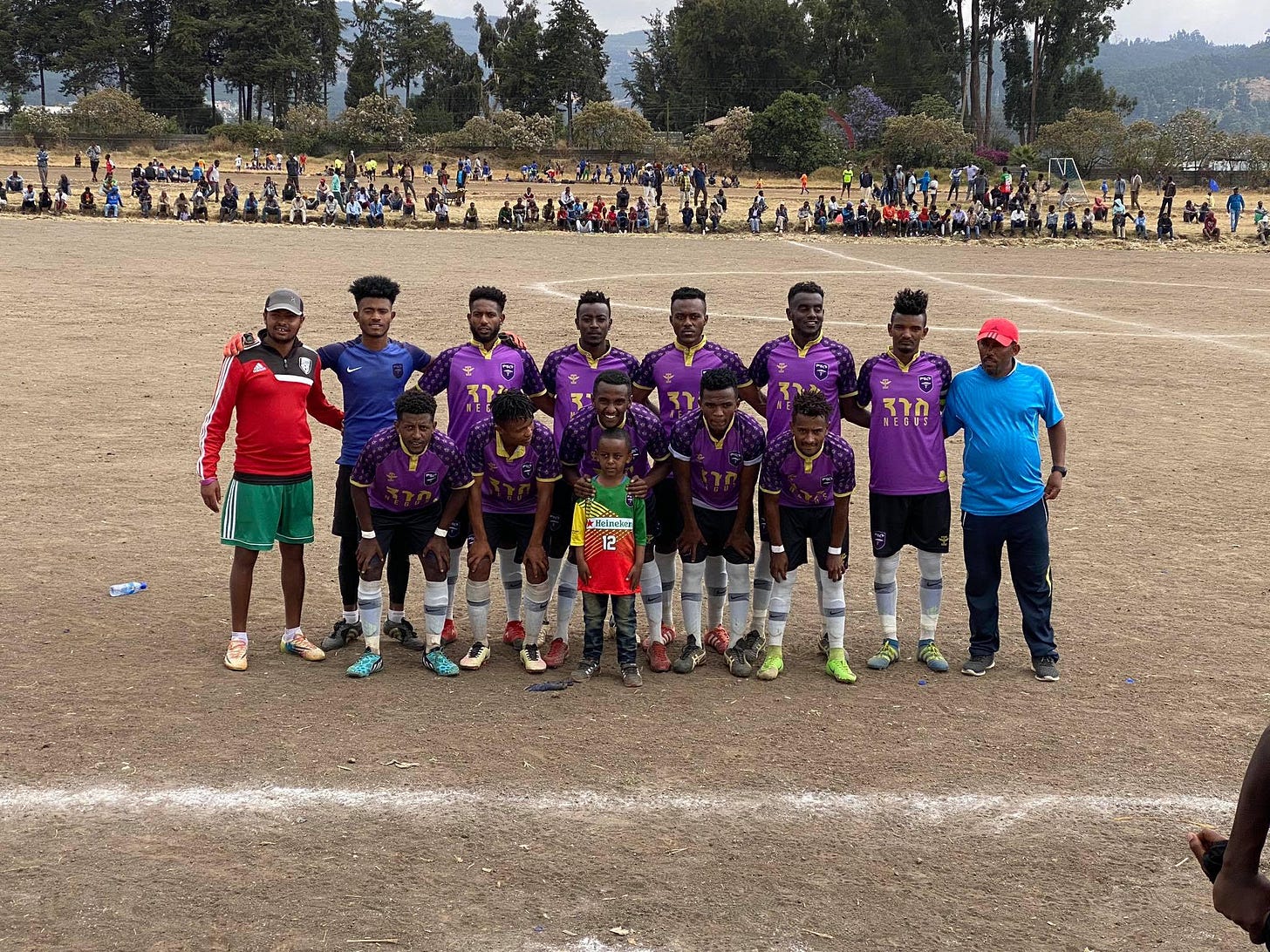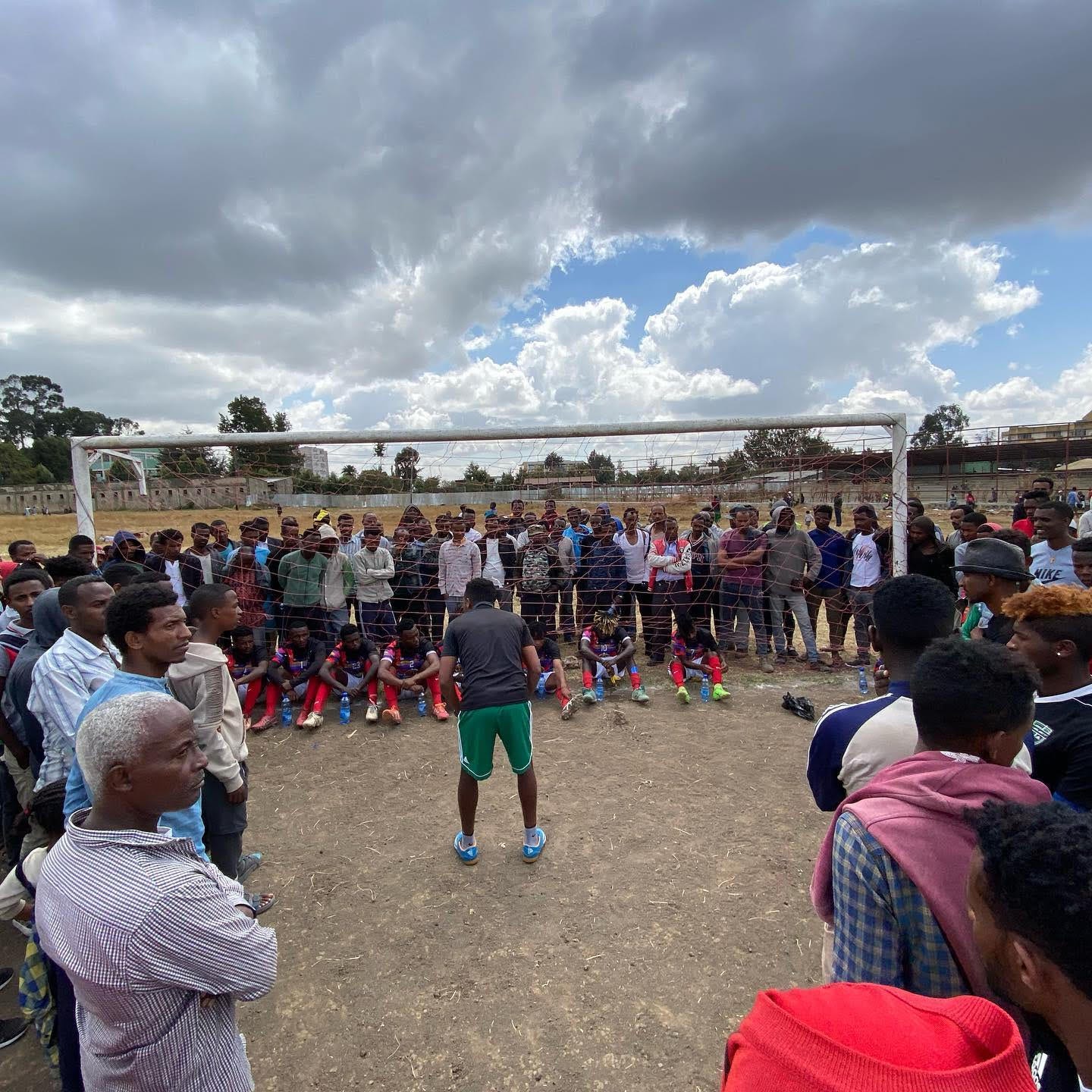Meheret FC wants to help Ethiopians live out their soccer dreams
The non-profit, semi-pro club in Addis Ababa is run by an American. But he'd rather not talk about that bit.
Ask Kyle Sanders what his title is with Meheret FC, the fourth-tier Ethiopian soccer club in Addis Ababa, and he couldn’t tell you.
Founder?
President?
Backer?
On the other side of a Zoom call Sanders shrugs apologetically, making his giant mane of brown hair and full beard bounce a little. He just doesn’t know.
That’s because he hasn’t spent much time thinking about it. Or, by appearances, any time at all. It isn’t the point of Meheret FC. He, to be precise, isn’t the point. The point of Meheret, the Amharic word for “mercy,” is simply to do some good where it can, to help its players build a better life, to give their future youth players better opportunities. And to win soccer games along the way.
Sanders is also wary of making himself or the American NGO Mercy Branch, which he co-founded the semi-professional club with, out to be some kind of savior. “I don’t want this to be ‘The American coming in and saving or helping Ethiopians,’” he says. “This is their thing as well. They have ownership of it also.”
The thing in question is a non-profit, semi-pro soccer team with a mission larger than results on the field. “We come at it from a more holistic perspective,” Sanders explains. “Most of the other teams take the best players and do what they can. It’s not just soccer for us. If there are two players [to pick from] and one has more of an at-risk background, we want to help [that] player. Provide a living wage for him; help him develop his gifts. We try to do right by the players and coaches and try to take care of them. And I think that’s something different than what exists in the landscape.”
As in much of the professional soccer world, late and missed payments and unkept promises are common in the Ethiopian game. That’s where Meheret tries to provide a reliable alternative, offering stability, particularly to a team of players who largely rely on the team for their survival. And while most of the players still work other jobs, soccer lightens their load significantly.
Mercy Branch is a faith-based organization, but Sanders says there is no religious component or objective to Meheret FC. “We are not bashing people over the head with religious stuff,” he says. “Ethiopia is this unique culture where all the religions coexist very peacefully. They’re very respectful of each other. It’s a beautiful thing and something that we don’t always experience here in the States. I personally don’t feel like it’s my place to try to sway someone, one way or another.”
In a soccer-mad but destitute Eastern African nation, where something of a civil war threatens to break out, the club ultimately sees itself as a way of bettering the circumstances of its players. To help them reach their dream of making the Ethiopian Premier League and the national team, perhaps. “If, over the years, we’re able to help a few players achieve their goals, then that’s largely success for us,” Sanders says. “Our success as a club is a byproduct of each of the individual successes that they’ll have.”
Sanders is the godfather of two Ethiopian adoptees, the oldest of whom he got to know when the then-13-year-old played on the high school team Sanders was coaching in Upstate New York. When the adoptive family moved to Addis Ababa to begin Mercy Branch, which gets homeless children off the street, Sanders began spending months at a time in Ethiopia as well. As a long-time coach and former college player who owns several franchises of the Soccer Shots organized soccer program for young children, starting a soccer team came naturally to him.
“I fell in love with the culture, fell in love with the people,” Sanders says. “I started to question how I could help more. Like a lot of things in life, it led back to football.”
The club began play in 2018 and, in spite of losing much of the 2020 season to COVID, already sits on the cusp of being promoted to the third of Ethiopia’s five professional or semi-pro tiers. It is currently battling in the fourth tier’s promotion tournament. The club hopes to add a youth academy for both at-risk boys and girls next year—with plans to support even its young players financially—and a senior women’s team the following campaign. It wants to build state-of-the-art facilities. And it plans to create youth leagues for ages below 12, which currently aren’t served.
But the Meheret project hasn’t always been straightforward. Although Sanders spoke to the Ethiopian federation before founding the club, making sure he followed its rules and protocols, he has still faced surprises. The travel cost for the current set of games, for instance, is about $4,500, and Meheret was under the impression that this amount would be covered by the league. It isn’t. So now the club, which runs on an annual budget of only $40,000 or so—the bulk of it supplied by Sanders himself—has to find that money.
The entire operation is lean, financially. While 500 to 1,000 spectators tend to show to Meheret’s home games on a dirt field, the club isn’t allowed to charge admission until it reaches the third division. And every time it moves up a tier, player salaries have to be bumped up accordingly.
But the headaches are worth it to Sanders.
“We do have a heart to serve and to provide an opportunity for young men and children who are up against it or having a hard time,” he says. “The goal, long-term, is that these players will change the course of their life, hopefully, by being part of the club. And that will have a ripple effect on future generations.”
Soccer Miscellany:















